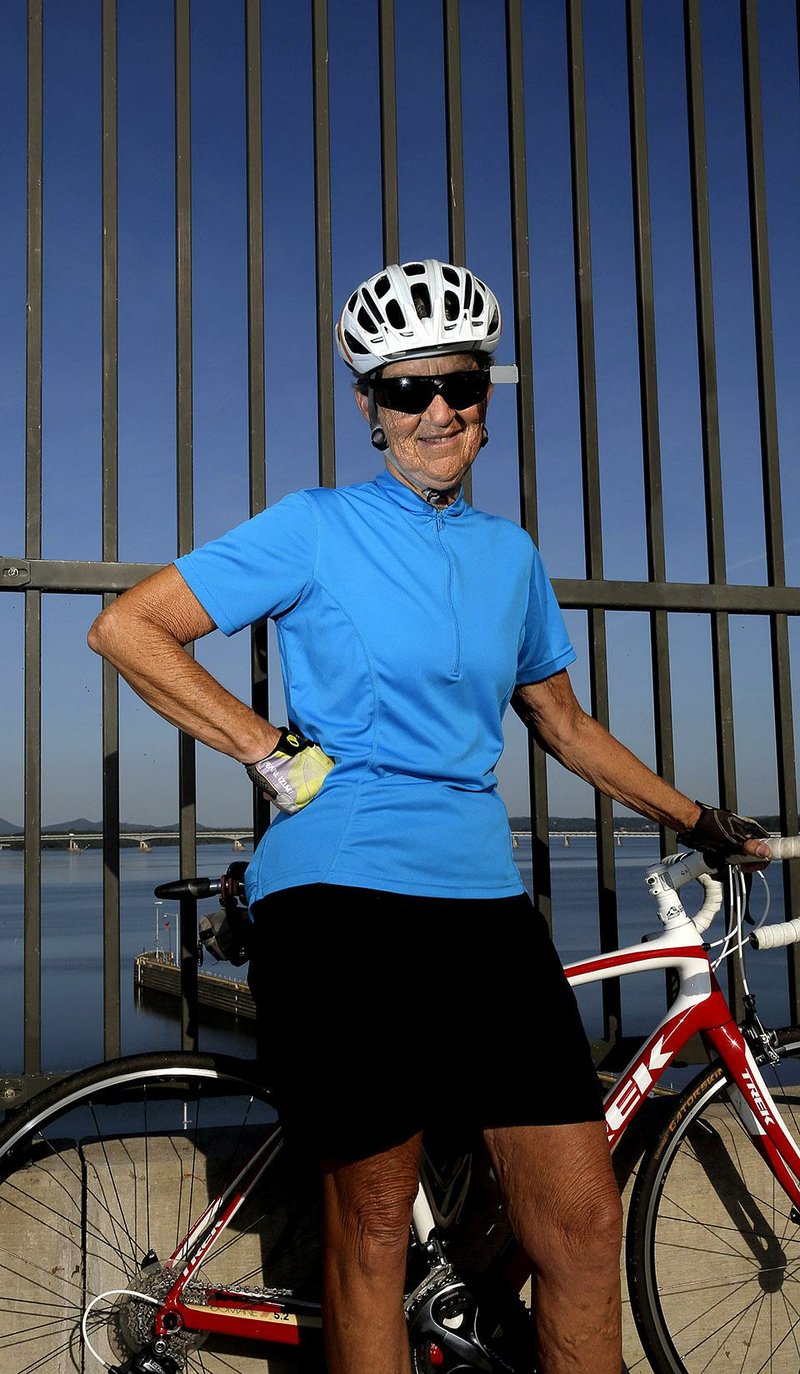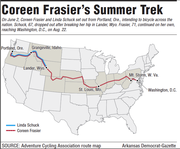It's roughly 4:30 p.m. on a mid-July day and bicyclists Coreen Frasier, 71, of Little Rock, and Linda Schuck, 67, of Arkadelphia, are muscling their way through the hills on the Wind River Indian reservation near Lander, Wyo.
Suddenly Frasier sees Schuck's bike flop to one side, spilling her friend in the path of oncoming traffic, had there been any. But Schuck immediately pops to her feet.
"Oh good, she's not hurt," Frasier thinks. Then, "but why isn't she getting out of the road?"
ABOUT A WEEK EARLIER
It's 2:30 p.m. and lunch is long overdue. Frasier and Schuck have already pedaled 7 1/2 hours today. They lock their bikes next to a bar advertising all-you-can-eat tacos and head inside.
A man at the bar is watching the World Cup. He notices their bikes and asks where they're heading. They tell him they're biking to the District of Columbia. They left Portland, Ore., June 2.
"There's supposed to be a campground in Grangeville, [Idaho]. Do you know where it is?" Frasier asks.
He doesn't, but why don't they just stay with him? He has plenty of room.
Frasier and Schuck exchange glances, and then Frasier turns to the waitress. "Do you know him? Is he safe?"
It wouldn't be the first time Frasier has stayed with strangers. When they learn the house is within walking distance, the women order beer -- something they don't do when they plan to get back on bikes.
A bit later, more cross-country cyclists come in -- a young couple from Oregon, riding a tandem bike, with their heads shaved in
honor of a mother fighting cancer, and a man from Missouri. Cyclists are common in Grangeville, which is on the Adventure Cycling Association's popular TransAmerica route.
Everyone orders beer and tacos and trades road stories as the afternoon slips into evening. Around 5 p.m. a few dozen people arrive, more or less en masse. They're all smoke jumpers (firefighters who parachute into wildfires) or the friends and family of smoke jumpers, here to celebrate someone's birthday. The cyclists and the soccer fan join the party, drinking and laughing until nearly 10 p.m.
TURNING POINT
"I wasn't totally committed. I wasn't all-in until we got to Grangeville," Frasier says.
But the impromptu gathering of fellow adventurers energized and encouraged her -- so much so that 740 miles later, after Schuck's wreck and diagnosis of a fractured hip, Frasier decided to go on alone.
She had nothing to prove. She'd biked in all 50 states and already completed five cross-the-whole-country bike trips. Three of those cross-country rides were "self-contained," meaning she schlepped her luggage on her back rack and racks attached to her front wheel, rather than relying on a vehicle to ferry it from town to town. She'd slept in campgrounds, city parks and on grassy patches beside parking lots. She'd biked on paved trails, gravel trails and the shoulders of highways and interstates.
This trip, she was eager to reach the 240-mile Katy Trail in Missouri, so she could spend a week biking with her daughter, who lives in the area.
Schuck assured Frasier she would have done the same thing had their positions been reversed. And Schuck knew that Frasier understood what she was going through. In 1995, six weeks into a cross-country bike trip, Frasier came down with a high fever in northwestern Nebraska. The local hospital diagnosed her with Crohn's disease and kept her for a week.
A few months later, back home in Little Rock, she underwent a "routine" Crohn's surgery.
When she woke from anesthesia, her doctor told her to put her affairs in order. Frasier didn't have Crohn's. She had stage III colon cancer.
BONUS YEARS
"I call these the bonus years, because I don't think I was really supposed to get through that," Frasier says.
When she was diagnosed with cancer, she was 51. She had run a dozen marathons and was biking roughly 6,000 miles a year.
She underwent a month of radiation and a year of chemotherapy, relying on her 80-year-old parents, who briefly moved to Little Rock from Nebraska to help her through the worst.
During her treatment, at times Frasier was still running and biking. She even did RAGBRAI (The Register's Annual Great Bicycle Ride Across Iowa), a week-long trek that she has made 25 times now. (She met Schuck, not in Arkansas, but at RAGBRAI.)
Frasier has outlived many friends, and others don't exercise the way they used to. Before this summer's trip, she visited a friend who lives in a nursing home due to mobility issues. Like Frasier, this woman is in her early 70s.
Frasier's first solo trip wasn't planned as such.
"On my 50th birthday," she says, "I was going to ride down to my daughter's in San Antonio, and then ride from San Antonio to Omaha" to see her parents.
She had recruited two RAGBRAI buddies to accompany her, a 54-year-old woman from Iowa and a 68-year-old man from Ohio. They were slated to leave in early summer, but that winter, both of her friends died -- one of cancer, the other of a heart condition.
Frasier went anyway. At first, she overestimated her stamina, pedaling from Little Rock to Arkadelphia (75 miles) the first day and from Arkadelphia to Texarkana (80 miles) the next, in near triple-digit temperatures.
When she reached San Antonio eight days in, her daughter had a banner across the door of her apartment and a gold bicycle pendant on a chain to welcome her.
"I've worn it around my neck ever since," Frasier says, fingering the necklace 20 years later. "It brings good luck, I think."
LOGISTICS
Even as a child, Frasier was athletic. She got her first bicycle at 6 -- a rudimentary thing with a rubber belt instead of a chain, so that if she pumped standing up, the belt fell off and the pedals locked.
When she was in school, there were no team sports for girls. (This was before the passage of Title IX in 1972.) But in college, she was sports chairman for her sorority and played in the Women's Recreational Association. A year in, she changed her major from nursing to physical education.
Her father was wary. "When you get to a certain age, you're not going to be able to teach PE anymore," he warned her.
Frasier taught in Nebraska schools and later in Little Rock at Parkview High School, Williams Magnet Elementary School and Rockefeller Early Childhood Magnet Elementary School. She retired at 61, but only because she wanted time for her massive bike tours and advocacy work.
Promoting Bicycle Advocacy of Central Arkansas (BACA), Metroplan, the Arkansas Bicycle Club and the League of American Bicyclists' Bicycle Friendly America program have become her full-time volunteer job; and bike tours have taken her to England, France and Germany.
On this summer's trip, she rode a 28-pound fold-up Bike Friday. She carried 44 pounds of gear, which included a tent, sleeping bag, two changes of clothes, rain protection, a multitool, an extra tire, two inner tubes, snacks and a stove so small it fits in her palm.
She wore a roughly 2-inch mirror affixed to the stem of her sunglasses, so that in her peripheral vision, she could see cars coming from behind. But there was no way to prepare for everything that might happen.
MID-AUGUST NEAR MOUNT STORM, W.VA.
It has been raining off and on all day, and the windy Appalachian road is deserted. This is fine by Frasier, because earlier, every passing car sprayed her with oily water. She's drenched, exhausted, hungry and, when she spots the bright yellow sign, elated. "M-O-T-E-L" it practically shouts.
When she reaches the motel, a man comes out of a house next door and tells her the place has been shuttered for years. She wants to pitch her tent in the yard, but her questions and presence seem to annoy him.
"There's a motel down the road," he tells her. "It's just 12 miles. It's mostly downhill."
Twelve miles translates into another hour and a half in a downpour, on a day when she'd already pedaled 70 miles and scaled three mountains. Sighing, she mounts her bike and heads out. She's only a few minutes away when thunder booms and lightning begins to slash the sky with alarming frequency.
Forty-five minutes later, she spots a convenience store.
"Coffee! Warmth!" she thinks, abandoning her bike against the side of the building.
As Frasier sips the hot liquid and drips on the floor, the women working the register confirm that she's miles from the motel. And the man was lying. There's a huge hill between here and there. Nor do they think there's a patch of grass where she can pitch her tent, although she's welcome to look.
Frasier steels herself and steps back into the rain, scouting the area around the store. It's entirely concrete.
Defeated, she retreats to the fluorescent glow, curls into a wooden chair and nurses her coffee. The store's grill is closed, so dinner will be cold cereal. It's 7:30 p.m. and dark, and she has nowhere to stay.
One of the employees finally takes pity on her.
"I get off at 9. If you want to hang out, I'll take you to a hotel," the woman offers.
HIGHLIGHTS REEL
"West Virginia was the pits," Frasier says, a month after her return to Little Rock. (She arrived in the nation's capital on Aug. 22 and flew home from there.)
It wasn't just the unfriendly former motel owner. The hills weren't hills: They were walls. The shoulders were riddled with chunky rocks, tossed in the road so vehicles could gain traction in the snow but never swept away. The interstates were full of "road-snakes," those thin, silver wires that become exposed when big-rigs throw a tire, and they can flatten a bike tire in minutes. (Frasier went through five tires on this trip.)
And West Virginia's Route 7 was the worst road she encountered. It had such a narrow shoulder that she spent miles sprinting from driveway to driveway, in 60-second breaks between traffic. (She figured that somewhere, unseen, there was a traffic light regulating her brief respites.)
But the bad times were offset by the kindness of strangers.
In one of the few West Virginia bright spots, a car pulled onto the shoulder, and a young woman bounded out, clutching a chocolate bar, an apple and a soda. "Which do you want?" she asked Frasier, enthusiastically.
As Frasier sipped the soda, the woman explained that she was on her way home (New Jersey) and had biked cross-country just last summer.
Another time, a trucker slowed beside Frasier and offered her $20, mistaking her for a vagrant. Locals bought her dinner and drinks, and she was interviewed by half a dozen newspaper reporters, all of them wanting to know if she gets bored biking long stretches.
She says her mind stays busy.
"I found myself rehearsing how things were going to be when I got to the next town. ... Was I going to go to the grocery store, to the restaurant? 'Oh, I hope they have roast beef sandwiches' ... you know, just stuff," she says. "And memories. Really, really good memories. Because I've done a lot of really wonderful things in my life."
She knows her age surprises people. "I'm sure it's weird from the outside, to see an older lady doing this ... but it doesn't seem weird to me. It's just my life."
She's not really sure why she continues to make extreme pilgrimages by bike. Maybe it has to do with that Robert Hastings essay she read in 1991. Titled "The Station," it encourages readers to "climb more mountains, eat more ice cream" -- advice she has taken literally on her bike tours.
Or maybe, it's just "because I can," Frasier says and grins.
ActiveStyle on 10/13/2014

